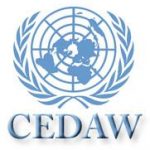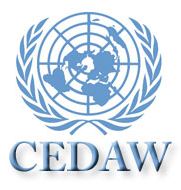 The United Nations Convention on the Elimination of All Forms of Discrimination Against Women (CEDAW) is an international human rights treaty which is often described as a bill of rights for women.
The United Nations Convention on the Elimination of All Forms of Discrimination Against Women (CEDAW) is an international human rights treaty which is often described as a bill of rights for women.
CEDAW sets out what governments must do to improve the situation of women living in the country, including addressing gender stereotyping and violence against women, promotion of gender equality in public life and protection of women’s rights to education, health and employment.
By ratifying CEDAW in 1985, Ireland agreed to take concrete steps to end gender-based discrimination and improve the situation of all women living here.
Ireland’s record under the UN Convention on the Elimination of All Forms of Discrimination Against Women (CEDAW) was examined at a hearing in Geneva on 15 February 2017. Ireland was last before the Committee in 2005. The CEDAW Committee published its Concluding Observations on Ireland on March 6th.
Key observations and recommendations by the Committee which impact on people parenting alone, sharing parenting, or separating include the establishment of a statutory maintenance authority, improved access to services for victims of domestic violence, amendment of current abortion legislation and examining the impact of austerity on disadvantaged women:
- Amend article 41.2 of the Constitution in order to remove the stereotypical language on the role of women in the home.
- Amend the Eighth Amendment which impedes the introduction of amendments to current legislation governing access to abortion.
- Repeal the Regulation of Information Act of 1995 in order to ensure free access to sexual and reproductive health information and education; and that healthcare providers, physicians and pregnancy counsellors do not operate under a constant fear that their services may be subject to criminal investigation and prosecution.
- Ensure the provision of post-abortion health-care services for women irrespective of whether they have undergone an illegal or legal abortion.
- Conduct prompt, independent and thorough investigations, in line with international human rights standards, into all allegations of abuse in Magdalene laundries, children’s institutions, Mother and Baby homes, and symphysiotomy.
- Intensify existing efforts to combat gender-based violence against women, including domestic violence, by ensuring that prosecutors and the police are properly trained to identify, investigate and prosecute cases of gender-based violence, including domestic violence, particularly targeting Traveller, Roma and migrant women and girls.
- Increase funding for civil legal aid services, review the financial eligibility criteria and end the requirement for victims of domestic violence to make financial contributions for civil legal aid.
- Intensify its efforts to guarantee equal opportunities for women in the labour market and create more opportunities for women to gain access to full-time employment.
- Address the impact of austerity measures on social benefits for women, particularly disadvantaged women.
- Undertake research on the economic consequences of divorce on both spouses, with specific attention to the differences in spouses’ earning potential and human capital, particularly focusing on whether judges take these factors into account in their decisions.
- Consider establishing a statutory maintenance authority and prescribing amounts for child maintenance in order to reduce the burden of women to litigate for child maintenance orders.
Valerie Maher, One Family Policy & Progammes Manager comments “It is clear from the above observations that while positive actions taken by Government to date have been acknowledged, there is still a significant amount of work that needs to be undertaken to improve the lives of women. Policy and legislation will need to incorporate the above recommendations going forward in order to achieve positive benefits for women in Ireland.”
The full report is available on the UN website
 The Irish Government will be examined by the United Nations Committee on the Elimination of All Forms of Discrimination Against Women (CEDAW) in Geneva tomorrow, 15 February 2017. Ireland’s compliance with the Convention on the Elimination of All Forms of Discrimination Against Women will be reviewed for the first time in 12 years. The Gender Equality Division of the Department of Justice and Equality oversees the preparation of Ireland’s periodic reports to CEDAW.
The Irish Government will be examined by the United Nations Committee on the Elimination of All Forms of Discrimination Against Women (CEDAW) in Geneva tomorrow, 15 February 2017. Ireland’s compliance with the Convention on the Elimination of All Forms of Discrimination Against Women will be reviewed for the first time in 12 years. The Gender Equality Division of the Department of Justice and Equality oversees the preparation of Ireland’s periodic reports to CEDAW.
One Family supports the recommendations made to the Committee by the Irish Human Rights and Equality Commission (IHREC), particularly in relation to the impact of austerity and low pay on women and the call for appropriate redress to be made available to women who suffered abuses within Magdalene Laundries and mother and baby homes. IHREC also highlighted the need for the State to revise its legislation on abortion in line with international human rights standards. IHREC’s recommendations can be read here.
One Family also supports the Equality Budgeting Campaign’s recommendations which highlight the impacts of the One-Parent Family Payment reforms, the disproportionate levels of poverty and deprivation experienced by women in lone parent households, the lack of a statutory child maintenance authority and the urgent need for equality and gender proofing in advance of budgetary and policy decisions. They can be read here.
Ireland last submitted its combined 4th and 5th Reports in 2003, on which it was examined in 2004. Ireland will be scrutinised by the Committee on its compliance with UN standards on protecting women and girls from discrimination. The Convention on the Elimination of All Forms of Discrimination against Women (CEDAW) was adopted in 1979 by the UN General Assembly and is “often described as an international bill of rights for women” (UN.org). Read more about CEDAW here.